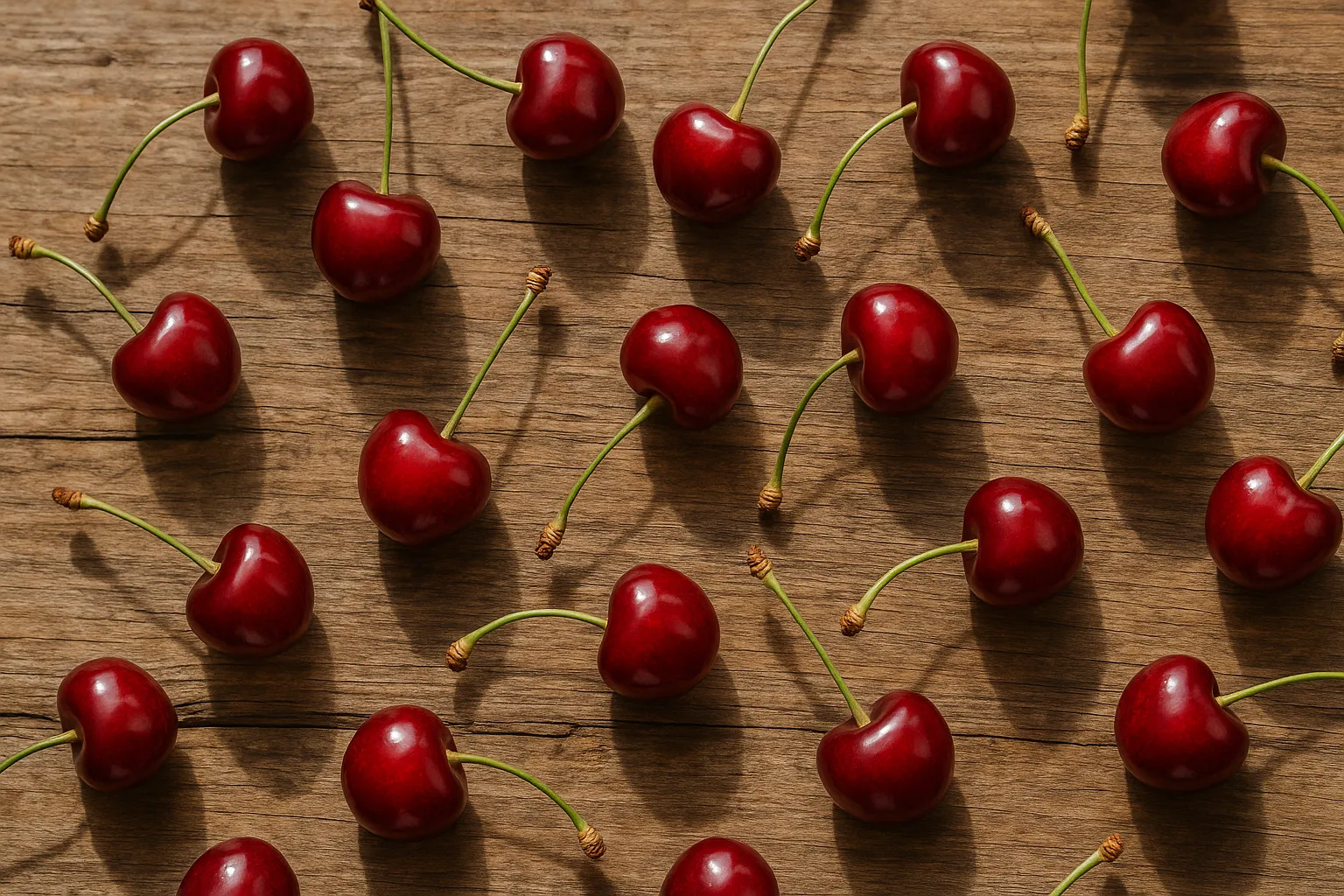Cherries: Calories, Nutrition and Health Benefits
Antioxidant-rich superfruit with powerful anti-inflammatory anthocyanins for gout relief, better sleep, and joint health.
Quick Nutrition Facts
Per 100g (about 14 cherries)
| Nutrient | Amount |
|---|---|
| Calories | 63 kcal |
| Protein | 1.1g |
| Carbohydrates | 16g |
| Fiber | 2.1g |
| Sugars | 12.8g |
| Fat | 0.2g |
| Vitamin C | 7mg |
| Potassium | 222mg |
| Anthocyanins | 12-25mg |
| Melatonin | 13.5ng |
Macronutrient Breakdown

NUTRITIONIST INSIGHT
Cherries contain some of the highest anthocyanin levels among fruits—up to 25mg per 100g. Tart cherries have 5x more anthocyanins than sweet cherries and are one of few natural melatonin sources.
Myth Busters
MYTH #1: Cherries Are Too High in Sugar
TRUTH: Despite 12.8g natural sugars, cherries have a low-to-moderate GI (22-32 for tart, 43-55 for sweet). The fiber and anthocyanins slow sugar absorption, making them diabetes-friendly in moderate portions.
MYTH #2: Cherry Benefits Are Just Marketing Hype
TRUTH: Clinical trials prove cherries reduce gout attacks by 35-45% and improve sleep by 84 minutes. The anthocyanins have documented anti-inflammatory effects comparable to NSAIDs like ibuprofen.
MYTH #3: Only Tart Cherries Have Health Benefits
TRUTH: Both tart and sweet cherries contain beneficial anthocyanins. Tart cherries have 5x more anthocyanins and melatonin, but sweet cherries provide more vitamin C and antioxidants. Both support heart health and reduce inflammation.
MYTH #4: Cherry Juice Is as Healthy as Fresh Cherries
TRUTH: Fresh cherries provide more fiber (2.1g per 100g) and fewer calories than juice. However, tart cherry juice concentrate offers higher anthocyanin doses for specific therapeutic uses like gout or sleep. Choose fresh for daily nutrition, juice for targeted benefits.
MYTH #5: Frozen Cherries Lose Their Nutrients
TRUTH: Frozen cherries retain 90-95% of their anthocyanins and vitamins. They're flash-frozen at peak ripeness, often preserving more nutrients than fresh cherries that sit in transport. Frozen cherries are equally beneficial and more affordable.
MYTH #6: You Need to Eat Pounds of Cherries for Benefits
TRUTH: Studies show 1-2 cups daily (21-42 cherries) or 8 oz tart cherry juice provides therapeutic benefits. This is approximately 100-200g, supplying 25-50mg anthocyanins.
NutriScore by Health Goals
| Health Goal | NutriScore | Why This Score? |
|---|---|---|
| Weight Loss |  | Only 63 calories per 100g with 2.1g fiber. Natural sweetness satisfies cravings without added sugars. Limit to 1 cup daily. |
| Muscle Gain |  | Low protein (1.1g) but rich in anthocyanins that reduce exercise-induced inflammation and support recovery. |
| Diabetes Management |  | Low-moderate GI, anthocyanins improve insulin sensitivity. Portion control: 1/2 to 1 cup. |
| PCOS Management |  | Anti-inflammatory anthocyanins help reduce PCOS inflammation. Moderate natural sugars, consume with protein/fat. |
| Pregnancy Nutrition |  | Rich in folate, vitamin C, and potassium. Safe fruit choice with low contamination risk. |
| Viral/Flu Recovery |  | High vitamin C and anthocyanins boost immunity, anti-inflammatory properties aid recovery, easy to digest. |
PERSONALIZED NUTRITION
Track your meals with NutriScan for personalized NutriScores based on your specific health goals!
Blood Sugar Response to Cherries
Understanding how cherries affect your blood glucose shows their favorable metabolic profile despite natural sugars.
Typical Glucose Response Curve
*This chart shows typical blood glucose response for general healthy individuals. Individual responses may vary. Not medical advice.*
How to Optimize Cherry Consumption
Pairing cherries with protein or healthy fats further stabilizes blood sugar:
- 🥜 Almonds or walnuts - Adds healthy fats and protein
- 🧀 Cheese or cottage cheese - Provides protein and calcium
- 🥛 Greek yogurt - Complete protein with probiotics
- 🥜 Nut butter - Healthy fats slow sugar absorption
The fiber and anthocyanins in cherries already minimize blood sugar spikes, making them one of the best fruit choices for blood sugar control.
Cultural Significance
Cherries have been cultivated for over 2,000 years, originating in the region between the Black and Caspian Seas.
Historical & Cultural Impact:
- Ancient Romans spread cherry cultivation across Europe
- Japanese cherry blossom (sakura) festivals celebrate cultural renewal
- Turkish Giresun region produces famous dark Gerdek cherries
- US produces 650 million pounds annually, mostly in Michigan and Washington
Medicinal Tradition:
- Traditional Chinese Medicine uses cherries for joint pain and inflammation
- European folk medicine prescribed cherries for gout since the 1500s
- Modern research validates these traditional uses with anthocyanin science
- Tart cherry supplements now standard in sports medicine for recovery
Compare & Substitute
Cherries vs Similar Fruits (Per 100g)
| Nutrient | 🍒 Cherries | 🫐 Blueberries | 🍓 Strawberries | 🫐 Blackberries |
|---|---|---|---|---|
| Calories | 63 kcal | 57 kcal | 32 kcal | 43 kcal |
| Carbs | 16g | 14g | 8g | 10g |
| Fiber | 2.1g | 2.4g | 2g | 5.3g |
| Protein | 1.1g | 0.7g | 0.7g | 1.4g |
| Fat | 0.2g | 0.3g | 0.3g | 0.5g |
| Vitamin C | 7mg | 9.7mg | 58.8mg | 21mg |
| Anthocyanins | 12-25mg | 25-495mg | 15-35mg | 115-407mg |
| Best For | Gout, sleep | Brain health | Vitamin C | Anti-inflammatory |
Frequently Asked Questions
Are cherries good for weight loss?
Yes, cherries support weight loss effectively. With only 63 calories per 100g and 2.1g fiber, they provide natural sweetness without excess calories. The anthocyanins may help reduce inflammation associated with obesity and improve fat metabolism.
Best practices: Limit to 1 cup daily (21 cherries, 97 calories), eat as a snack between meals, pair with protein (Greek yogurt, nuts) for sustained fullness, choose fresh or frozen over dried cherries (which concentrate sugars).
Do cherries really help with gout?
Yes, multiple studies confirm cherries reduce gout attacks. Research shows eating cherries or drinking tart cherry juice reduces gout flares by 35-45%. The anthocyanins lower uric acid levels and reduce inflammation.
Effective dosage: 1-2 cups fresh cherries daily, or 8 oz (240ml) tart cherry juice concentrate, or 1 tablespoon cherry extract twice daily. Effects typically seen within 2-4 weeks of consistent consumption.
Can diabetics eat cherries?
Yes, diabetics can safely eat cherries in moderation. Despite 12.8g sugar per 100g, cherries have a low-to-moderate glycemic index (22-32 for tart, 43-55 for sweet). The anthocyanins may improve insulin sensitivity by 15-20%.
Guidelines for diabetics:
- Limit to 1/2 to 1 cup per serving (50-100g)
- Choose tart cherries for lower GI
- Pair with protein or healthy fat
- Monitor blood sugar 2 hours after eating
- Count as 15g carbohydrates per 3/4 cup
Do cherries help you sleep better?
Yes, tart cherries are one of the few natural food sources of melatonin (13.5ng per gram). Studies show tart cherry juice increases sleep time by 84 minutes and improves sleep quality.
Sleep protocol: Drink 8 oz (240ml) tart cherry juice 30-60 minutes before bedtime, or eat 1 cup tart cherries 1 hour before bed. Effects typically improve after 1-2 weeks of consistent use.
Are tart cherries healthier than sweet cherries?
Tart (sour) cherries have significantly more anthocyanins—up to 5x higher—and contain natural melatonin that sweet cherries lack. They also have a lower glycemic index (22-32 vs 43-55).
Tart cherries best for: Gout, arthritis, sleep, inflammation, recovery Sweet cherries best for: Vitamin C, lower calorie snacking, general antioxidants, taste preference
Both types offer substantial health benefits; choose based on your specific health goals.
How many cherries should I eat per day?
General Health: 1 cup (21 cherries, 154g) = 97 calories, 25g carbs Gout/Arthritis: 1-2 cups fresh cherries or 8 oz tart cherry juice Weight Loss: 1/2 to 1 cup as a snack (50-97 calories) Diabetes: 1/2 to 3/4 cup (limit to 15-20g carbs)
More than 2 cups daily may provide excess sugar and calories. Track portions with NutriScan app to match your health goals.
Are frozen cherries as healthy as fresh?
Yes, frozen cherries retain 90-95% of their anthocyanins, vitamins, and antioxidants. They're flash-frozen at peak ripeness, often preserving more nutrients than fresh cherries shipped long distances.
Benefits of frozen: More affordable, available year-round, no pitting required, perfect for smoothies. Use the same as fresh for recipes, snacks, and health benefits.
Can you eat too many cherries?
Yes, overconsumption can cause digestive issues (bloating, diarrhea from sorbitol), excess sugar intake (12.8g per 100g), and potential weight gain. Some people may experience allergic reactions.
Safe limit: 1-2 cups daily (100-200g). Symptoms of excess: digestive upset, blood sugar spikes in diabetics, weight gain from excess calories.
 ChatGPT
ChatGPT  Claude
Claude  AI Mode
AI Mode  Perplexity
Perplexity 



